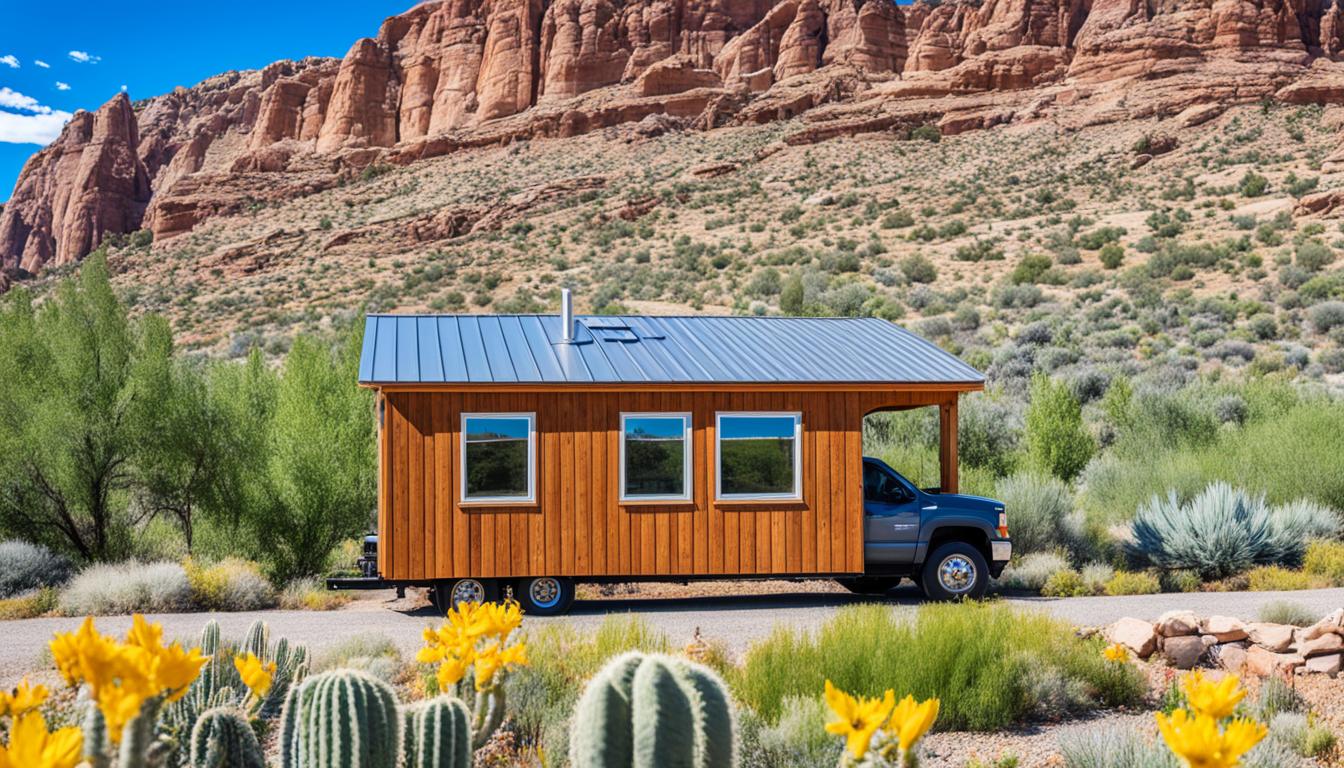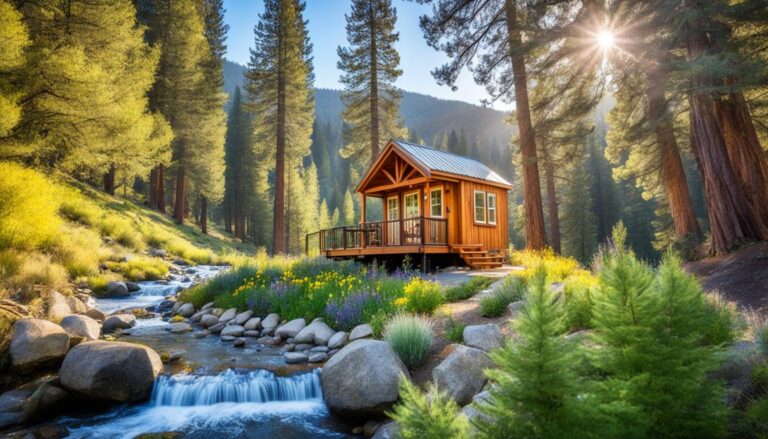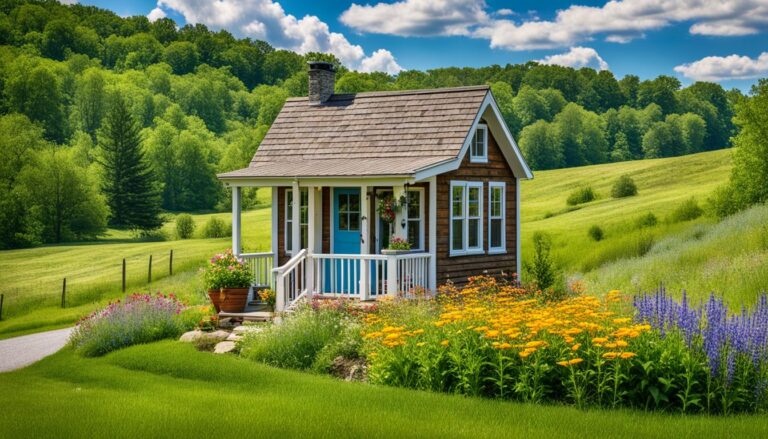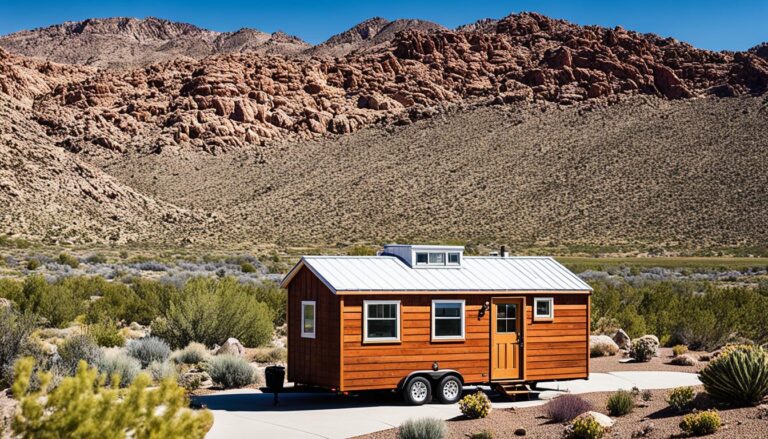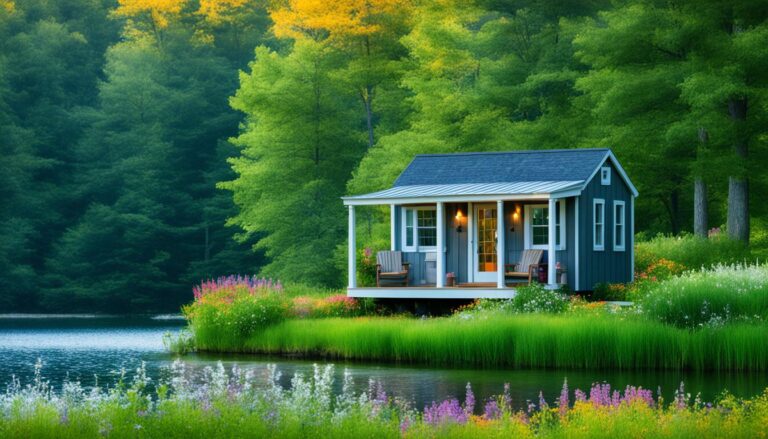Where Can I Put a Tiny House in Utah? Legal Locations
Did you know that Utah does not have a state-wide code regulating tiny houses? That means if you’re looking to settle down in Utah with a tiny house, you’ll need to navigate the unique zoning regulations and municipality laws that vary between counties and cities. It can be a challenging process, but with the right information, you can find legal locations to put your tiny house in Utah.
Some counties in Utah allow for tiny houses on foundations, while others have restrictions on tiny homes on wheels. In addition, there are tiny house communities and accessory dwelling units (ADUs) in Utah that provide alternative options for living in a tiny house. To ensure a smooth journey, it’s essential to research the specific rules and regulations in the county or city where you plan to settle down.
Key Takeaways:
- Utah does not have a state-wide code regulating tiny houses.
- Rules and regulations for tiny houses vary between counties and cities in Utah.
- Some counties allow for tiny houses on foundations, while others have restrictions on tiny homes on wheels.
- There are tiny house communities and ADUs in Utah that provide alternative living options.
- Researching the specific regulations in the county or city where you plan to put your tiny house is crucial.
Understanding Tiny House Regulations in Utah
In Utah, each jurisdiction sets its own building standards and zoning laws, which can impact the regulations for tiny houses. Some localities may welcome tiny houses as an affordable housing option, while others may be more concerned about neighborhood character preservation or infrastructure.
Tiny homes on foundations are generally considered permanent residences and must meet county-specific building codes.
Tiny houses on wheels are often classified as recreational vehicles (RVs) and may be subject to restrictions on full-time habitation.
It is important to research the specific regulations in the county or city where you plan to put your tiny house in Utah.
Counties in Utah That Allow Tiny Houses
When it comes to tiny houses in Utah, the regulations can vary significantly from one county to another. It’s important to familiarize yourself with the rules and regulations in your specific area to ensure compliance and a smooth transition to tiny house living.
One county in Utah that is known for being tiny house-friendly is Washington County. Here, tiny homes with less than 300 square feet are permitted in residential zones, as long as they have access to utilities. This county provides a welcoming environment for those looking to downsize and embrace a simpler way of life.
Salt Lake County is another county in Utah that allows for tiny houses. In this county, tiny dwellings under 400 square feet are permitted on residential lots with larger homes. However, these tiny houses must be on a foundation and meet basic sanitary standards.
Washington County and Salt Lake County are great options for those interested in living in a tiny home in Utah. These counties have regulations in place that accommodate tiny houses and provide opportunities for residents to embrace a more minimalistic lifestyle.
While Washington County and Salt Lake County have specific regulations for tiny houses, Wasatch County does not have specific rules in place. If you plan to build a tiny house in Wasatch County, it is important to check the local zoning regulations to ensure compliance with the county’s requirements.
It’s also worth noting that other counties in Utah may have their own regulations for tiny houses. Therefore, it is essential to research and understand the specific laws in the county where you plan to build or park your tiny house.
Overall, knowing the regulations and understanding the specific rules in each county is crucial when it comes to choosing the right location for your tiny house in Utah.
Tiny House Regulations in Major Utah Cities
When it comes to tiny house living in Utah, it’s important to understand the specific regulations in the major cities. In Salt Lake City, tiny house regulations allow for the construction of tiny houses under 400 square feet on residential lots alongside larger homes. These homes must be built on a foundation and comply with basic sanitary standards. This provides an excellent opportunity for those looking to downsize and live simply in the heart of Utah.
Eagle Mountain City is also tiny house-friendly, allowing for tiny houses on wheels in certain residential areas. This is great news for those who prefer the mobility and flexibility of a tiny house on wheels. It’s essential to check the specific regulations and zoning requirements in Eagle Mountain City to ensure compliance.
“Living in a tiny house has been a dream of mine, and Salt Lake City’s regulations have made it possible. I love that I can have a small, sustainable home in the heart of the city while still enjoying all the amenities and resources available.” – Jane, Salt Lake City Resident
Provo, another major city in Utah, is currently considering a law that would permit additional dwelling units, including tiny homes, in certain residential zones. This potential change in tiny house regulations presents an exciting opportunity for those considering tiny house living in Provo. It’s always recommended to stay updated with the latest developments and consult local authorities for the most accurate information.
Building a Tiny House on a Foundation in Utah
When it comes to building a permanent residence, many people in Utah are opting for tiny houses on foundations. These compact homes offer a unique way to embrace a simpler lifestyle while still enjoying the comfort and stability of a traditional home. However, constructing a tiny house on a foundation in Utah requires careful consideration of the state’s specific requirements and building codes.
To ensure compliance with building regulations, it is crucial to work with a licensed contractor who is familiar with the Utah IRC foundation code. This code outlines the necessary guidelines for constructing a sturdy and safe foundation for your tiny house. From load-bearing requirements to proper soil transfer, the IRC foundation code sets the standards that must be met for a structurally sound foundation.
Additionally, your property must be graded to direct surface runoff to a storm sewer conveyance, as specified by the regulations. This ensures proper drainage and helps prevent issues with water accumulation and erosion.
By adhering to the Utah IRC foundation code and collaborating with a licensed contractor, you can build a tiny house on a foundation that meets all necessary requirements. This will give you peace of mind knowing that your home is structurally sound and compliant with Utah’s building codes.
“Building a tiny house on a foundation in Utah requires knowledge of the IRC foundation code and collaboration with a licensed contractor to ensure compliance and safety.”
Whether you choose to build in one of Utah’s tiny house-friendly counties or within a city with specific regulations, constructing a tiny house on a foundation provides a permanent and secure living option. It allows you to fully embrace the benefits of tiny house living while enjoying the stability and comfort of a traditional home.
Next, let’s explore the regulations and considerations for those interested in living in a tiny house on wheels in Utah.
Living in a Tiny House on Wheels in Utah
Living in a tiny house on wheels in Utah can be an exciting and unconventional way to embrace minimalism and mobility. However, it’s essential to understand the regulations and constraints that come with this lifestyle choice. Unlike some areas in Utah that view mobile tiny homes as recreational vehicles (RVs), not all counties consider them suitable for permanent residences. Therefore, navigating the rules and finding suitable parking spaces for tiny houses on wheels can be a challenge.
Many counties and cities in Utah have specific regulations regarding where you can park and stay in a tiny house on wheels. Some places may require you to park in designated RV parks or campgrounds, while others may allow you to park on private properties with the owner’s permission. It’s crucial to research and comply with the regulations of the county or city where you plan to park your tiny house on wheels.
Utah Tiny House on Wheels Regulations
In Utah, mobile tiny homes are often classified as recreational vehicles (RVs). However, the classification may vary from one county to another, making it crucial to understand the local regulations. Some counties may have restrictions on parking and living in a tiny house on wheels, while others may require additional fees for permanent residence status.
It’s important to note that not all RV parks or campgrounds may accept tiny houses on wheels as they might have specific requirements or restrictions. Some places may only allow short-term stays rather than permanent residency. Before choosing a parking location, conduct thorough research to find RV parks, campgrounds, or private properties that cater to tiny house living. When contacting these locations, inquire about their policies and any fees associated with parking and staying in a tiny house on wheels.
Tiny House Communities in Utah
Tiny house communities are becoming increasingly popular in Utah as people seek sustainable and affordable housing options. These communities offer a unique way of living, fostering a sense of community and providing shared resources and spaces.
One notable tiny house community in Utah is the Wasatch Common Cohousing Community located in Salt Lake City. This community offers a close-knit lifestyle, where residents can enjoy the benefits of shared resources such as gardens, workshops, and communal spaces. It provides an opportunity to live sustainably and foster meaningful connections with like-minded individuals.
Another exciting tiny house community in Utah is the Riverbed Ranch. With a vision of self-sustainability and self-reliance, this community aims to create a harmonious environment for 250 homesteaders. Residents can embrace a more independent way of living, focusing on sustainable practices and cultivating a connection with nature.
When it comes to building a tiny house in Utah, working with a reputable builder is crucial. Great Lakes Tiny Homes is an RVIA-certified builder that ensures compliance with construction, safety, and regulatory standards, giving homeowners peace of mind regarding the quality and safety of their tiny homes.
Living in a tiny house community can be an excellent way to downsize and simplify your lifestyle while enjoying the benefits of a supportive and like-minded community.
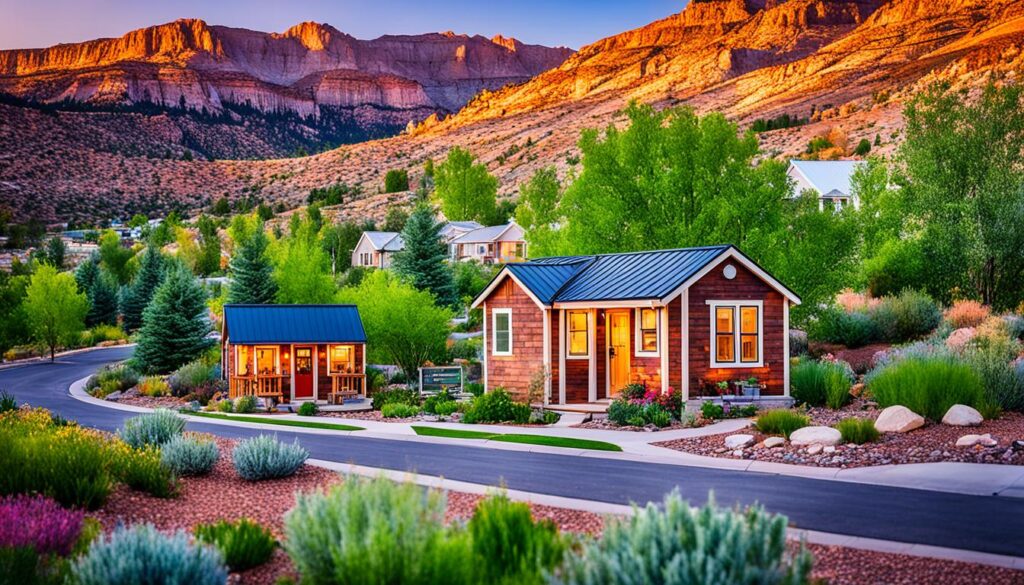
Benefits of Tiny House Communities in Utah
“Tiny house communities offer a unique way of living, fostering a sense of community and providing shared resources and spaces. Residents can enjoy a close-knit lifestyle, sustainable living practices, and meaningful connections with like-minded individuals.”
Explore Great Lakes Tiny Homes for high-quality and compliant tiny house solutions in Utah.
Benefits of Choosing a Tiny House in Utah
Choosing a tiny house in Utah has numerous benefits that make it an attractive option for those seeking affordable and sustainable living. Tiny house living in Utah provides an opportunity to reduce expenses without compromising on comfort or style.
One of the most appealing aspects of tiny house living in Utah is the affordability it offers. With lower construction and maintenance costs, tiny houses provide affordable housing that allows homeowners to save money for other important aspects of their lives. Whether you are looking to save for a dream vacation, start a business, or invest in your future, choosing a tiny house in Utah can help you achieve your financial goals.
Another advantage of tiny house living is its focus on sustainability. Utah’s stunning landscapes serve as a reminder of the importance of preserving and protecting our environment. By opting for a tiny house, you are making a conscious choice to reduce your environmental footprint. Tiny houses require fewer resources to build and maintain, minimizing waste and promoting more eco-friendly lifestyles.
Living in a tiny house in Utah also provides an opportunity to immerse yourself in the state’s natural beauty. Utah is renowned for its breathtaking national parks and scenic landscapes. Imagine waking up each morning to the majestic mountains or the serene desert, just steps away from your tiny house. With a tiny house, you can have the best of both worlds – a cozy and comfortable home nestled in the heart of nature.
Real-Life Testimonial: Kristen Smith, Tiny House Owner in Utah
“Choosing a tiny house in Utah has truly transformed my life. Not only do I have a beautiful and cozy home, but I’m also able to live sustainably and enjoy the incredible natural beauty that surrounds me. The affordability of a tiny house has allowed me to pursue my passion for travel and adventure while still having a place to call my own. I wouldn’t trade my tiny house life in Utah for anything!”
Furthermore, tiny house living in Utah opens doors to vibrant and close-knit communities. Engaging with fellow tiny house enthusiasts and joining tiny house communities in Utah can provide a support network and a sense of belonging. These communities often foster a strong sense of community spirit and shared values, creating a supportive and inclusive environment for all residents.
However, before making the decision to choose a tiny house in Utah, it’s important to consider the unique challenges and limitations that come with tiny house living. While the benefits are significant, it’s crucial to weigh them against personal preferences and lifestyle requirements. By conducting thorough research and engagement with local regulations, you can determine if a tiny house in Utah aligns with your goals and aspirations.
Do You Have to Pay Property Taxes for a Tiny House in Utah?
When it comes to property taxes for a tiny house in Utah, the answer depends on the specific regulations in your county or city. If your tiny house is considered a permanent residence, you may be responsible for property taxes. Property taxes for tiny houses Utah are typically based on the assessed value of the property and are used to fund local services and infrastructure.
However, if your tiny house is classified as a recreational vehicle on wheels, you may not be required to pay property taxes. In Utah, taxes for tiny homes on wheels Utah are often handled differently because they are considered mobile and may not be considered a permanent residence for tax purposes.
It is important to check with your local zoning office or tax assessor’s office to determine the tax obligations for your specific situation. They can provide you with the most accurate and up-to-date information regarding Utah property tax laws and how they apply to your tiny house.
Understanding the tax implications of owning a tiny house in Utah is crucial for proper financial planning. By researching and clarifying the regulations in your area, you can ensure compliance with local tiny house as permanent residence Utah guidelines and fulfill your tax obligations accordingly.
Where to Park a Tiny House in Utah
Finding a place to park a tiny house in Utah can be a challenge due to zoning regulations and restrictions. However, there are several options available for those looking to park their tiny homes.
One option is to park your tiny house in RV parks. RV parks in Utah often have designated spaces for tiny houses and provide amenities and services tailored to tiny house living. These parks offer convenient locations and a community of like-minded individuals who appreciate the simplicity and freedom of tiny house living. Some popular RV parks in Utah include Zion River Resort and River Park Utah.
Campgrounds are another viable option for parking a tiny house in Utah. These natural settings provide a serene and peaceful environment, allowing tiny house owners to connect with nature while enjoying the comforts of their home. Campgrounds such as Salt Lake City KOA and Strawberry Bay Campground offer picturesque locations and recreational activities.
For those seeking more privacy and flexibility, private properties can be an excellent choice for parking a tiny house in Utah. However, it is crucial to obtain permission from the property owner and ensure that the property complies with zoning laws and regulations. Websites like Tiny House Community and Tiny House Park Finder provide directories of private properties and communities that welcome tiny houses.
Before moving your tiny house to Utah, it is essential to research and secure a suitable parking location that aligns with your needs and preferences. Consider factors such as proximity to amenities, zoning regulations, and long-term feasibility. By exploring RV parks, campgrounds, and private properties, you can find the perfect spot to park your tiny house in Utah and enjoy the freedom and simplicity of tiny house living.
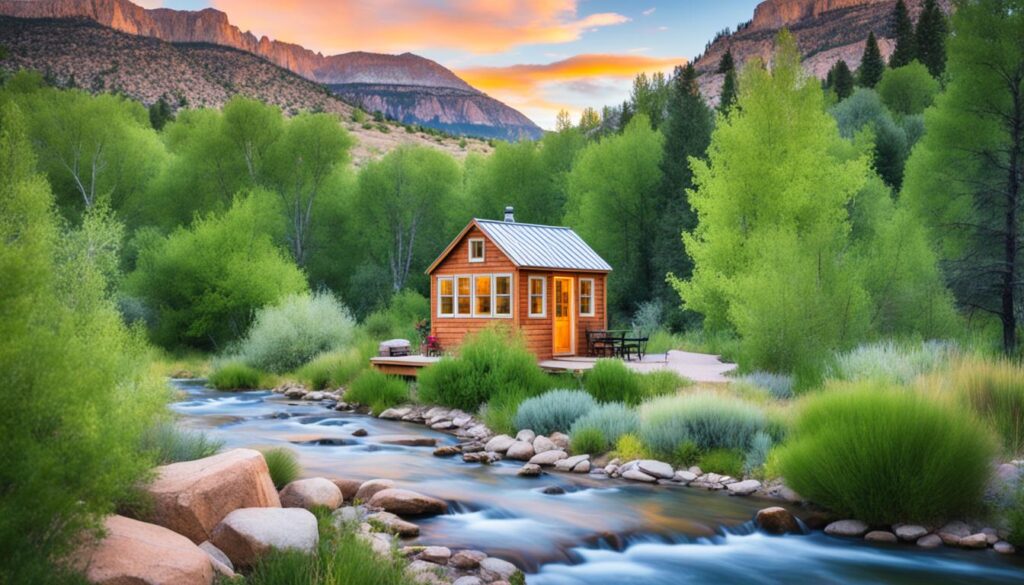
Finding Your Perfect Spot for a Tiny House in Utah
When it comes to finding a spot for your tiny house in Utah, there are a few important factors to consider. One of the first steps is to research licensed tiny house builders who can assist you in navigating the regulations and requirements. These professionals have the expertise to ensure that your tiny house is built to code and meets all necessary standards.
One resource you can explore is Great Lakes Tiny Homes, a company authorized by the RV Industry Association (RVIA) that specializes in constructing small houses. They prioritize compliance with construction, safety, and regulatory standards, providing you with peace of mind throughout the building process.
Additionally, there are various online platforms that offer a wide range of tiny house plans and designs. These resources allow you to explore different layouts and styles that align with your needs and preferences. By selecting a design that suits your lifestyle, you can ensure that your tiny house is not only functional but also reflects your personal taste.
When planning your tiny house journey in Utah, remember that the state does not have a statewide statute that regulates tiny homes. As a result, local governments in different counties and cities have the authority to set their own standards. It’s crucial to have a clear understanding of the specific regulations in the county or city where you intend to place your tiny house.
One option to consider is Washington County, where the minimum square footage required for a tiny house is less than 300 square feet. If you prefer to reside in Salt Lake County, you’ll find that they allow tiny dwellings less than 400 square feet on residential lots where larger homes already stand. These counties offer opportunities for tiny house living within their respective regulations.
Transitional structures, including tiny homes designed to be frequently moved, are also an option in Utah. While they may not be considered permanent residences, they provide flexibility and mobility for those seeking a dynamic living situation.
“Tiny house communities in Utah are gaining popularity, offering a sustainable and affordable housing option with communal resources and shared spaces.”
Utah’s Tiny House Communities
The growing popularity of tiny house communities in Utah is another avenue to explore. These communities provide a sustainable and affordable housing option, along with communal resources and shared spaces. They offer a close-knit lifestyle and a sense of belonging.
Wasatch Common Cohousing Community, located in Utah, is one such community that provides a range of amenities, including internet access, a library, a garden, and outdoor relaxation spaces. This community fosters a sense of togetherness and offers an enriching environment.
Riverbed Ranch Community, also in Utah, is a cooperative aimed at self-sustainability and self-reliance among homesteaders. This community focuses on promoting a more self-sufficient and interconnected way of living.
With a multitude of options available, finding your perfect spot for a tiny house in Utah is an exciting and fulfilling endeavor. By researching licensed builders, exploring online resources, and considering the benefits of tiny house communities, you can create a personalized and sustainable living space that suits your desires and values.
Conclusion
Living in a tiny house in Utah requires navigating the unique regulations and laws that vary between counties and cities. While some areas in Utah allow for tiny houses on foundations with specific size requirements, others may have restrictions on tiny houses on wheels or classify them as recreational vehicles subject to temporary stay limitations.
It is crucial to research the specific regulations in the county or city where you plan to put your tiny house in Utah. Working with licensed professionals, such as Great Lakes Tiny Homes, an RVIA-certified builder, can ensure compliance with local and state building codes, safety standards, and regulatory criteria.
With careful planning and consideration, you can find the perfect spot for your tiny house in Utah. Select locations include RV parks, national parks and campgrounds, tiny house communities like the Wasatch Common Cohousing Community and Riverbed Ranch Community, and private properties. Embracing tiny house living in Utah offers the opportunity for sustainable living, affordability, and a simpler lifestyle.
FAQ
Where can I put a tiny house in Utah?
The regulations for tiny houses in Utah vary between counties and cities. Some counties allow for tiny houses on foundations, while others have restrictions on tiny homes on wheels. It is important to research the specific rules and regulations in the county or city where you plan to put your tiny house in Utah.
What are the regulations for tiny houses in Utah?
Utah does not have a state-wide code regulating tiny houses, so the rules and regulations vary between counties and cities. Some areas may have specific rules for tiny houses, while others may have restrictions on tiny homes on wheels or require compliance with building codes for permanent residences.
Can I put a tiny house in any county in Utah?
Each county in Utah sets its own building standards and zoning laws, which can impact the regulations for tiny houses. Some counties may be more welcoming to tiny houses as an affordable housing option, while others may have stricter rules to preserve neighborhood character. It is important to research the regulations in the specific county where you plan to put your tiny house in Utah.
Are there any regulations for tiny houses in major cities in Utah?
Yes, some major cities in Utah have their own regulations for tiny houses. For example, Salt Lake City allows for tiny houses under 400 square feet on residential lots alongside larger homes, as long as they are on a foundation and adhere to basic sanitary standards. Eagle Mountain City also permits tiny houses on wheels in certain residential areas. Other cities, such as Provo, may be considering new laws to allow for additional dwelling units, including tiny homes, in certain residential zones. It is important to research the regulations in the specific city where you plan to put your tiny house in Utah.
Can I build a tiny house on a foundation in Utah?
Yes, building a tiny house on a foundation in Utah is a popular option for those looking for a permanent residence. These tiny homes are subject to county-specific building codes and must meet requirements set out by the International Residential Code (IRC) for foundations. It is important to work with a licensed contractor who can ensure that your tiny house meets all the necessary requirements for a foundation in Utah.
Can I live in a tiny house on wheels in Utah?
Living in a tiny house on wheels in Utah can be more challenging due to regulations that classify them as recreational vehicles (RVs). Not all counties in Utah consider mobile tiny homes as RVs, which can make it more difficult to use them as permanent residences. Some places may have restrictions on parking and staying in a tiny house on wheels, and there may be additional fees for those who want to live permanently in a tiny house. It is important to research the specific regulations in the county or city where you plan to park your tiny house on wheels in Utah.
Are there any tiny house communities in Utah?
Yes, there are several tiny house communities in Utah. Wasatch Common Cohousing Community in Salt Lake City offers a close-knit lifestyle with communal resources and shared spaces. Riverbed Ranch in Utah is a community of 250 homesteaders working towards self-sustainability and self-reliance. Great Lakes Tiny Homes is an authorized builder dedicated to meeting the strictest construction and safety standards for tiny houses. These communities provide unique options for those looking to downsize and live simply in Utah.
What are the benefits of choosing a tiny house in Utah?
There are several benefits to choosing a tiny house in Utah. Tiny houses offer an affordable housing option for those looking to reduce their expenses and live more simply. They also provide an opportunity for sustainable living, as they typically require fewer resources to build and maintain. Utah’s beautiful landscapes provide a scenic backdrop for tiny house living, and tiny house communities offer a close-knit and eco-friendly lifestyle. It is important to consider the benefits and drawbacks of tiny house living when deciding if it is the right choice for you in Utah.
Do I have to pay property taxes for a tiny house in Utah?
Whether or not you have to pay property taxes for a tiny house in Utah depends on the specific regulations in your county or city. If your tiny house is considered a permanent residence, you may be responsible for property taxes. However, if your tiny house is classified as a recreational vehicle on wheels, you may not be required to pay property taxes. It is important to check with your local zoning office to determine the tax obligations for your specific situation.
Where can I park a tiny house in Utah?
Finding a place to park a tiny house in Utah can be challenging due to zoning regulations. Some options for parking a tiny house include RV parks, campgrounds, and private properties. RV parks typically have amenities and services for tiny house living, while campgrounds provide a more natural setting. Private properties may require permission from the owner and may have additional restrictions. It is important to research and secure a suitable parking location before moving your tiny house to Utah.
Where can I find a licensed tiny house builder in Utah?
Finding the perfect spot for a tiny house in Utah involves researching licensed tiny house builders who can help navigate the regulations and requirements. Working with an expert contractor can ensure that your tiny house is built to code and meets all necessary standards. There are also resources available online for finding tiny house plans and designs that fit your needs and preferences. It is important to have a clear plan and understanding of the regulations before starting your tiny house journey in Utah.

